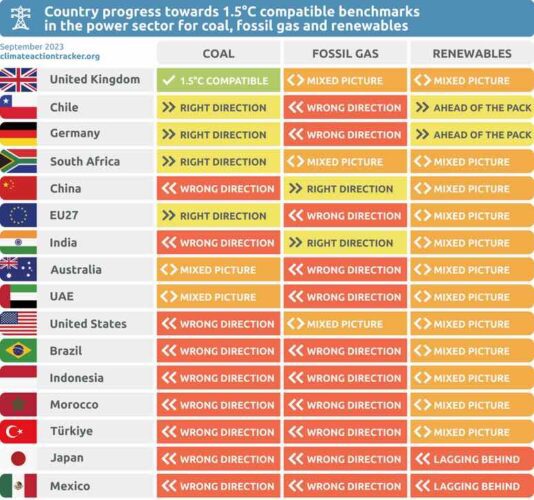Australia is one of 16 countries failing to effectively decarbonise their power sectors in line with global climate goals, according to a new report from the Climate Action Tracker.
The Climate Action Tracker released a new analysis on Tuesday of progress across 16 major economies in fossil gas, coal, and renewable power. The results were mixed, with no country fully on track to decarbonise in line with 1.5°C warming scenarios, though Climate Action Tracker did notice some positive signs.
According to global and country-specific benchmarks designed by Climate Action Tracker, only one country can boast a 1.5°C compatible rating – and that’s the UK for its coal exit. Four countries are moving in the “right direction” in terms of exiting coal, while two of these – Chile and Germany – are also “ahead of the pack” on renewables.
Looking specifically at Australia, Climate Action Tracker determined that “Australia is at a crossroads.”
“Australia’s electricity generation mix is dominated by coal,” the report explained, “but has the potential for a rapid exit if it continues to advance on adding new renewable energy capacity, transmission lines and storage. But its goal to decarbonise its power sector does not have a target year and it is adding new fossil gas capacity.”
As such, Australia has a “mixed picture” in terms of its coal and renewable strategies and is going in the “wrong direction” for fossil gas.

Maybe most concerning is Australia’s lackadaisical attitude towards fossil gas, which provides around a fifth of the country’s power. There is no deadline nor commitment to phase out fossil gas, and several Australian states are building or planning new gas capacity.
Climate Action Tracker determines that fossil gas must be phased out by 2035 for 1.5°C compatibility, meaning that any new capacity only serves to create the “risk of stranded assets or further entrenching fossil gas power beyond sustainable levels.”
Similarly, there is no national plan to phase out coal from its generation mix, “despite its ageing, and increasingly unreliable, coal power fleets.” States are stepping into the gap as leaders in a state-by-state coal phase-out, but with the lack of federal support this only ensures the sector remain in a state of “significant flux”.
Lastly for Australia, the Australian government’s stated renewable energy generation target of 82% by 2030 “is not enshrined in legislation” and, to be 1.5°C compatible, Australia “needs to be generating at least 95% of its power from renewables in 2030.”
Globally, there are some bright spots. Both the US and the UK boast 2035 power sector decarbonisation targets that are in line with the needed unabated fossil gas phase-out by 2035, but both need to do more to actually achieve said targets.
Alongside the UK’s 2024 coal phase out – which is on a 1.5°C compatible timeline – and the EU, Germany, Chile, and South Africa all heading in the right direction, Brazil “could” get on the right track, but only if it repeals Bolsonaro-era legislation.
Overall, developed countries must exit coal by 2030 in order to align with a 1.5°C compatible world, leaving room for the rest of the world to exit coal by 2040.
To reach this benchmark, Climate Action Tracker believes that coal needs to shrink rapidly from providing over a third of power generation today to the low single digits by 2030.
Vitally, Climate Action Tracker concludes that “there is no room to expand coal power generation anywhere.”
Unfortunately, while renewable deployment is booming, it is still not growing at the pace needed to phase out fossil fuels in line with a 1.5°C warming scenarios. Similarly, none of the 16 countries analysed by Climate Action Tracker has an explicit plan for fossil gas phase out, and the fossil gas pipeline is now larger than the pipeline for coal.
And while the global coal pipeline is shrinking outside of China, a coal plant permitting spree in China is a significant cause for concern.
“This month the G20 agreed a global renewable energy goal,” said Neil Grant, report lead author.
“Our global benchmark for renewables, mapped onto the national level, highlights the real opportunities for wind and solar expansion. Yet governments still appear to be hedging their bets and procrastinating on a fossil fuel phase-out.
“What is also clear from our work is that we find no role for CCS in a decarbonised power sector. The future of fossil fuels in a 1.5˚C compatible power sector transition – abated or unabated – is the same: one of swift decline.”










